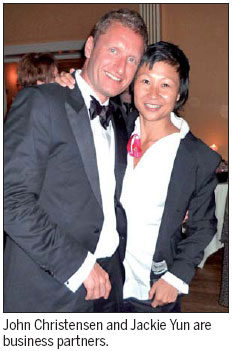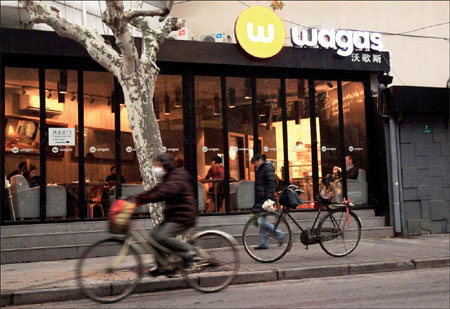Long break for Coffee
Updated: 2012-12-07 09:10
By Yao Jing (China Daily)
|
|||||||||||
|
One of the Wagas cafes in Shanghai. Photos Provided to China Daily |

The lack of a decent sandwich and a Chance Meeting Between a dane and an Asutralian led to the opening of a small cafe in Shanghai - now the pair run 26 stores
When Australian Jackie Yun came to China, it was to learn Chinese for a year. Now 14 years later, she is the co-owner of a successful and expanding cafe business, which has just opened its first store in Beijing.
Despite its reputation as a nation of tea drinkers, China began to get a taste for coffee around 12 years ago. That's when Starbucks opened its first cafe on the mainland and started to tempt the Chinese towards what was originally regarded as a strange and bitter drink. While Starbucks was busy changing tastes in Beijing, a homegrown cafe brand opened its first store in Shanghai.
That company was Wagas, launched by a young Dane called John Christensen, who decided to open the business after he had trouble finding a good sandwich. Christensen enlisted Yun to help with the business, originally as a member of staff and later as a partner, and Yun's Chinese adventure has continued on since, as together they have ridden the changing tastes of China to manage a thriving business.
According to 39-year-old Yun, "Initially, people would come and look at the turkey sandwich, open it, take the bread off and then look at the lettuce and tomato. Finally they would only eat the meat because they thought it was terrible to eat uncooked food."
Today, things are different. Sandwiches and salads are the most popular items on the Wagas menu and the small cafe that opened on Citic Square in Shanghai has expanded into a company with 26 stores across China.
The cafe chain's customer base has also altered dramatically over the years. Ten years ago, 90 percent of its clientele were from overseas; today, half are Chinese.
"From around four years ago, more Chinese people began to accept our brand. People come to try new things, to meet friends, to treat someone or to have a meeting," says Yun.
Yun's journey towards Wagas began in 1999 when she left Sydney for Shanghai to learn Chinese.
She found work in a restaurant, where she first met Christensen, who was a customer.
"He was watching how I worked and heard from someone that I was leaving the restaurant and was interested in starting my own business," she says.
That led to a meeting at which Christensen agreed he would offer Yun a job, and if she performed well, a partnership in the business.
Yun began as a shop manager for two years, before the pair set up a new company together in 2001 to expand the business.
Now Yun handles the cafe management while Christensen operates the company logistics.
"Christensen's company is very busy," says Yun. "He is like my backbone. I do all the daily work and we meet once a week to discuss the cafe operations and always make decisions together."
Yun conducts random food and drink tests at Wagas cafes in order to ensure that quality remains consistent.
"I don't like to have a lot of meetings. I prefer to work hands on. Sometimes I help the staff serve and then watch them. If I see something wrong, I talk with the shop manager," she says.
One of the keys to success in the Chinese cafe business is maintaining quality, according to Yun.
"The food industry has matured very quickly," she says. "It is catching up in Beijing now, and confronted with more competition we are always trying to make things a little better."
In order to assure consistence of quality, Wagas opened its own bakery in 2010 after terminating a contract with a bread supplier.
Today, Yun and Christensen have expanded beyond Wagas and operate nine brands, including Bistrow, Cirka, Baker & Spice and Wagas Express. All of them began in Shanghai, because of Yun and Christensen's familiarity with the city.
"We don't do high-end places. We focus on casual eating," says Yun.
The Wagas of today has come a long way from the first cafe, according to Yun. "It was too fast-food style. I was so lucky that when I joined he closed the first store to do renovation work," she says.
Today, Wagas exudes a comfortable and easygoing attitude, with dark wooden floors, light wooden tables, gray sofas, green walls hung with handwritten menus, tall French windows and well placed chandeliers. The feeling is warm and simple like a Danish home.
In jeans and a green sweater, sitting at a table with an iPad in front of her, Yun looks like any other customer at Wagas' first Beijing cafe, which was opened in July this year.
The Sanlitun Village location attracts mostly white-collar workers and nearby residents, and at 2pm on a Tuesday it was packed, despite most of the lunchtime crowd having already departed.
The customers were a mixture of mothers having a get-together with their children, friends meeting over a coffee, people working on laptops and others finishing off a late lunch.
"Every week, we change the daily special menu," says Yun, to keep the local crowd from getting bored of the food. Around 70 percent of customers are returnees, she says. "This means they come here at least three times every week."
The Beijing cafe manager is Zheng Xiaobo, who previously worked for the company in Shanghai.
"Every week I see some familiar customers in the Beijing cafe who have been to our Shanghai stores," says the 30-year-old manager, who has been working for Wagas for 10 years. At the end of the year, once the Beijing cafe has passed its hectic opening period, he will return to Shanghai.
According to Yun, the company will open a second cafe in Beijing in March followed by a third in May.
"Next year, I hope to open three or four stores in Beijing," she says.
Choosing a location is one of the most important factors in launching a new cafe, according to Yun.
"Most of the time, it is a feeling. We look around and sometimes even ride bicycles through the streets and alleys in Shanghai," she says.
Yun originally intended to stay in China for one year, but has now been in the country for 14 years.
"When I take a holiday and go back to Australia, I feel it is too slow and relaxed," she says. "Young people should work hard. When you are old, you will have a lot of time for rest."
yaojing@chinadaily.com.cn
(China Daily 12/07/2012 page29)
Today's Top News
Rescuers race against time for quake victims
Telecom workers restore links
Coal mine blast kills 18 in Jilin
Intl scholarship puts China on the map
More bird flu patients discharged
Gold loses sheen, but still a safe bet
US 'turns blind eye to human rights'
Telecom workers restore links
Hot Topics
Lunar probe , China growth forecasts, Emission rules get tougher, China seen through 'colored lens', International board,
Editor's Picks

|

|

|

|

|

|






